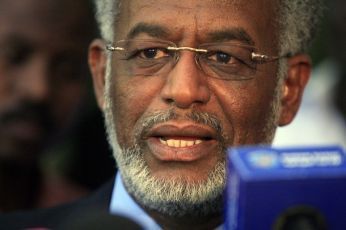Khartoum’s “Plan B” against South Sudan revealed
February 6, 2012 (KHARTOUM) – Sudan’s foreign ministry has revealed details of what it called ‘Plan B’ to confront South Sudan, saying it entails economic pressure and support to southern rebel groups.

Karti, who was speaking in an interview with Sudan national radio, gave a glimpse of what ‘Plan B’ would look like, saying it involves Khartoum playing ‘security cards’ to destabilise the south.
The already tense relationship between Sudan and South Sudan has currently reached its nadir since the south declared independence in July last year as a result of a vote granted under the 2005 Comprehensive Peace Agreement (CPA), which ended more than two decades of civil war between the two sides.
A bitter dispute over the transit fees land locked South Sudan should pay to export its oil through Sudanese territories to the Red Sea port of Port Sudan has escalated dramatically in recent weeks.
As talks to resolve the issue hit a snag, Khartoum moved to sequester southern oil, prompting Juba to accuse it of stealing and suspend oil production all together.
The recently separated countries also traded accusations of supporting each others rebel groups.
Khartoum says Juba is supporting rebel fighters of the Sudan People’s Liberation Movement North (SPLMN) in South Kordofan and Blue Nile, along the contested borders with the South, whereas Juba routinely blames Khartoum for alleged support of southern rebel groups and proliferation of arms in southern territories.
Al-Obaid Marawih, the official spokesman of Sudan’s foreign ministry, on Sunday shed more light on the nature of his boss’s threats.
He said in press statements that Sudan would not hesitate to exercise “economic pressure” on the government of South Sudan and extend support to southern rebels if Juba continues to support Sudanese rebels.
Marawih further revealed that Khartoum would launch a parallel diplomatic offensive, adding that Sudanese delegates would tour neighbouring states to brief them on efforts exerted by Khartoum to establish good economic and diplomatic relations with Juba.
The spokesman said that Khartoum did everything in its power for the sake of good relations with the south but received nothing in return but hostility.
Therefore, he added, South Sudan is now warned of Khartoum’s intention to use “Plan B” in return.
However, he later said that “Plan B” is not something Khartoum intends to execute tomorrow or the day after, adding that this option could be used if Khartoum completely fails to establish good relations with the south and stop Juba from harming it.
Sudan’s President Omer Al-Bashir has raised concerns of renewed conflict between the two countries when he suggested during an interview on Friday that the current climate is closer to war than to peace.
Meanwhile in Khartoum, the opposition Popular Congress Party (PCP) led by Hassan Al-Turabi has warned the government against beating the drums of war with the south.
Speaking to Sudan Tribune following a party meeting on Monday to discuss the current developments, the PCP’s political secretary Kamal Umar accused the Sudanese government of deliberately fuelling tension with the South by issuing hostile statements without accepting any responsibility for separating the South and starting conflicts in South Kordofan and Blue Nile.
Umar said that his party believes that resolving the current dispute lies in Khartoum’s acceptance to export southern oil without charge in order to help southern citizens as well as amending the Sudanese citizenship law and give Sudanese citizenship to whoever is interested in it.
The opposition official considered the fact that the Khartoum government is calling for war as “a dangerous precedent”. He went on to accuse Al-Bashir’s government of seeking to drag the country to an abyss of destruction.
Umar concluded by calling on the southern government to observe patience and wisdom, saying that they should understand that the behaviour of the government does not represent Sudanese people.
(ST)
